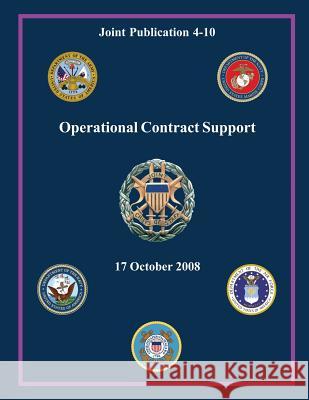Operational Contract Support » książka
Operational Contract Support
ISBN-13: 9781483901534 / Angielski / Miękka / 2013 / 170 str.
The continual introduction of hi-tech equipment, coupled with force structure and manning reductions, and high operating tempo mean that military forces will often be significantly augmented with contracted support. To do this, contract support integration and contractor management must be integrated into military planning and operations. Commanders and their staffs must have a working knowledge of key joint contract support integration and contractor management related terms, since these terms are not widely known outside of the professional acquisition community. Contingency acquisition, the process of acquiring supplies, services and construction in support of the joint operations begins at the point when a requiring activity identifies a specific requirement, defines the proper funding support, contract award, and administration requirement to satisfy activity needs. Contract execution begins with the award of the contract by a warranted contracting officer and ends when contractor performance is complete or the contract is otherwise terminated by the contracting officer. Contract closeout is executed once the contract has been completed and all outstanding contract administration issues have been resolved and ends once the contracting officer has prepared a contract completion statement. Understanding the roles and responsibilities of DOD, joint, and Service commanders and staffs related to operational contract support is critically important to all commands and staffs that may be involved with planning and managing contracted support and contractor management. Contracting is commonly used to augment organic military and other sources of support such as multinational logistic support, host-nation support, and to provide support where no organic capability exists, but contracting is often not properly planned for or integrated into the overall joint force logistic support effort. Contracting authority is the legal authority to enter into binding contracts and obligate funds for the USG, while command includes the authority and responsibility for effectively using available resources and for planning the employment of, organizing, directing, coordinating, and controlling military forces for the accomplishment of assigned missions. Command Authority (combatant command command authority]) includes the authority to perform functions involving organizing and employing commands and forces, assigning tasks and designating objectives, and giving authoritative direction over all aspects of an operation; it does not include authority to make binding contracts or obligate funds on behalf of the USG. Systems support contracts are generally issued when the Service systems contracting activities award the original systems contracts. External support contracts are often used to provide significant logistic support and selected non-logistic support to the joint force. Theater support contracts are those contracts that are issued by deployed contingency contracting officers and are generally awarded to local vendors to support in-theater customers. This publication establishes doctrine for planning, conducting, and assessing contracting and contractor management functions in support of joint operations. It provides standardized guidance and information related to integrating operational contract support and contractor management, defines and describes these two different, but directly related functions, and provides a basic discussion on contracting C2 organizational options.
Zawartość książki może nie spełniać oczekiwań – reklamacje nie obejmują treści, która mogła nie być redakcyjnie ani merytorycznie opracowana.











